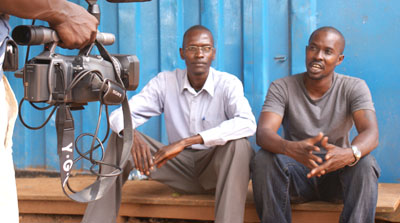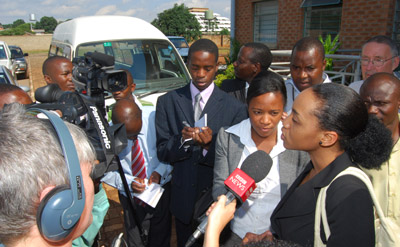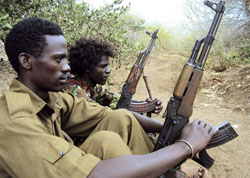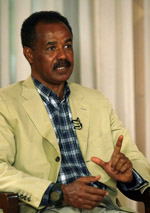Mohamed Keita/Africa Research Associate
Mohamed Keita is advocacy coordinator for CPJ's Africa Program. Keita has written about independent journalism and development in sub-Saharan Africa for publications including The New York Times and Africa Review, and has appeared on NPR, the BBC, Al-Jazeera, and Radio France Internationale. Keita has also given presentations on press freedom at the World Bank, U.S. State Department, and universities. Follow him on Twitter: @africamedia_CPJ.

Freedom of information laws struggle to take hold in Africa
In Uganda, a ruling this week in a landmark case of two journalists seeking to compel their government’s disclosure of multinationals oil deals highlighted the challenges to public transparency just before media leaders, press freedom advocates, officials, and former U.S. President Jimmy Carter gather in Ghana next week at the African Regional Conference on the Right…

Zambian editor acquitted in hospital ‘obscenity’ case
As the news editor of Zambia’s largest circulation newspaper and a mother to two young children, Chansa Kabwela already has her hands full. For the last four months, however, this 29-year-old journalist was mired in a court case with a peculiarity that made international headlines and sparked a debate on press freedom in this landlocked nation in southern Africa. The case…

Ethiopia pushes Kenyan TV to drop report on rebels
Last week, the Ethiopian government tried to force private Kenyan broadcaster Nation Television (NTV) to drop a four-part exclusive report on separatist rebels in southern Ethiopia. NTV aired the first two parts of “Inside Rebel Territory: Rag-Tag Fighters of the Oromo Liberation Front,” which led Ethiopia’s ambassador to Kenya to accuse the Nation Media Group of giving a platform…

Eritrean president slams ‘CIA-financed’ media
Last week, President Isaias Afeworki of Eritrea, Africa’s leading jailer of journalists, discussed press freedom during an extensive interview with Swedish broadcaster TV4. Afeworki, a revered guerrilla commander who led this Red Sea country to nationhood in 1993, banned Eritrea’s budding private media in 2001 and threw journalists in secret prisons without charge or trial.…
Swazi columnist criticizes king, gets fined … in cows
About two weeks ago, traditional authorities in the mountain kingdom of Swaziland slapped the nation’s most outspoken political columnist, Mfomfo Nkambule, with a fine–to be paid in cows–for criticism of the administration of King Mswati III, Africa’s last absolute ruler.
Swazi reporter gets apology amid allegations of sexism
This week in the mountain Kingdom of Swaziland, the state-owned daily Swazi Observer reported that an official has apologized for summarily dismissing a female reporter from Parliament nearly two weeks ago. It was the latest in a controversy sparked by allegations of gender discrimination against Mantoe Phakathi, an award-winning journalist with the private monthly The…
Guinean media at near-standstill after president’s death
With the death on Monday of Guinean President Lansana Conté, uncertainty hangs over what–or who–is to follow. Yet, as recently as last week, coverage of the poor health of the reclusive autocrat, who ruled this mineral-rich but poor West African nation since 1984, proved risky for the Guinean independent media.
Burkina Faso police question Zongo protesters
This morning, police in Burkina Faso summoned four leaders of a march over the weekend that called for a renewed investigation into the unsolved 1998 assassination of investigative journalist Norbert Zongo. Among those questioned was Jean-Claude Meda, the president of the Association of Journalists of Burkina Faso, who told me that he received a call…